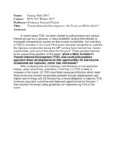Transit-Oriented Development: On Track or Off the Rails?

View/
Author
Park, George Brett
Subject
Washington and Lee University -- Capstone in Shepherd Program for the Interdisciplinary Study of Poverty and Human Capability
Transit-oriented development
Gentrification
Capabilities approach (Social sciences)
Discrimination in housing
Metadata
Show full item recordDescription
George Brett Park is a member of the Class of 2017 of Washington and Lee University. Capstone; [FULL-TEXT FREELY AVAILABLE ONLINE] In recent years TOD has been viewed by policymakers and various interest groups as a panacea to many problems ranging from obesity to increased transportation access for low-income households. But how likely is TOD to increase in the future? And given how past transportation policies like highway construction during the 20th century have harmed low-income communities, what would this mean for the poor? These prompts lead me to the overarching question of this paper: given a likely increase in Transit-Oriented Development (TOD), how could policymakers approach these developments so that opportunities for low-income households are improved, rather than diminished?
After analyzing and synthesizing a vast literature on transportation history, urban economics, and ethics, I find that: (1) TOD is likely to increase in the future; (2) TOD most likely cause gentrification which most likely harms low-income households primarily through displacement and higher cost of living; and (3) Society has a moral obligation to improve TOD to ensure equitable outcomes and improved opportunities for the poor. I then provide five broad policy guidelines for implementing TOD in the future. George Park